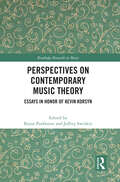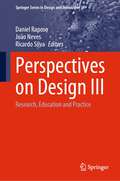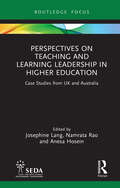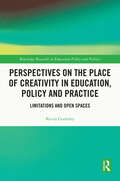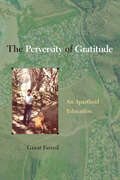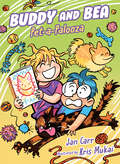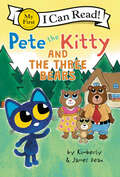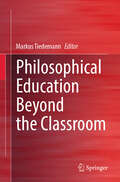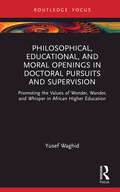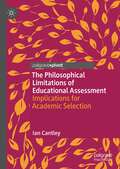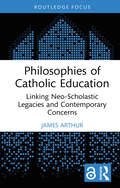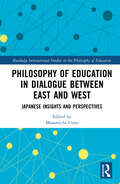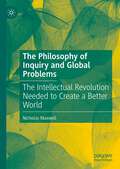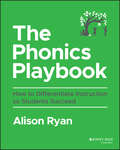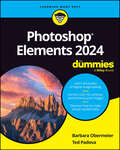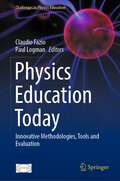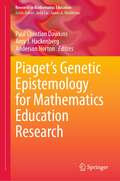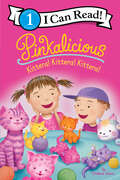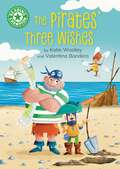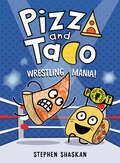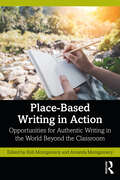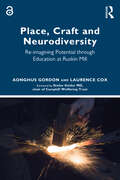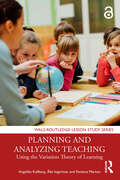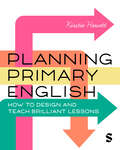- Table View
- List View
Perspectives on Contemporary Music Theory: Essays in Honor of Kevin Korsyn (Routledge Research in Music)
by Bryan Parkhurst Jeffrey SwinkinKevin Korsyn is a renowned music theorist, musicologist, and pedagogue who has taught at the University of Michigan since 1992. He has published widely and influentially in areas as diverse as Beethoven and Brahms studies, chromatic tonality, disciplinarity and metatheory, history of theory, musical meaning and hermeneutics, poststructuralism (deconstruction, intertextuality, etc.), and Schenkerian theory and analysis. Because of the scope and caliber of his published work, and also his legacy as a pedagogue, Korsyn has had a profound impact on the field of music theory, along with the related fields of historical musicology and aesthetics. This book, a festschrift for Korsyn, comprises essays that constellate around his numerous scholarly foci. Represented in the volume are not only familiar music-theoretical topics such as chromaticism, form, Schenker, and text-music relations, but also various interdisciplinary topics such as deconstruction, disability studies, German Idealism, posthumanism, and psychoanalysis. The book thus reflects the increasingly multifaceted intellectual landscape of contemporary music theory.
Perspectives on Design III: Research, Education and Practice (Springer Series in Design and Innovation #34)
by Daniel Raposo João Neves Ricardo SilvaThis book reports on interdisciplinary research and practices in communication, fashion, product, and interior design, highlighting strategies for systematizing the design approach in a global and digital world. It gathers a selection of chapters written by the authors of the best articles presented at the 8th EIMAD conference, on July 07–08, 2022, Portugal. This chapters were chosen considering their particular link to contemporary concerns and challenges, considering the design contribution to health and well-being, social inclusion, sustainable development, design education, and environment and, among others. They cover and bridges between important aspects of design education, research, and practice, as well as creativity and emerging technology, offering a timely perspective and a source of inspiration to researchers, professionals and educators in design, product development and related fields.
Perspectives on Teaching and Learning Leadership in Higher Education: Case Studies from UK and Australia (SEDA Focus)
by Josephine Lang Namrata Rao Anesa HoseinPerspectives on Teaching and Learning Leadership in Higher Education has been designed to bring together case studies to facilitate the development of effective and well-equipped leaders within the higher education sector.With the growing global emphasis on higher education to improve the quality of the learning experience for increasingly diverse students, this book focuses on good leadership in teaching and learning by illustrating the lived experiences of academics and sharing case studies which highlight moments and instances that positively impacted their professional development as leaders. The globally relevant case studies included provide insights into the different ideas implemented by leaders for learning and teaching projects. Through these case studies, the decision-making processes of leaders are made visible to other aspiring leaders in similar positions. This resource will be invaluable in enhancing and enriching the learning experience of students, as this book demonstrates that academic leadership is intricately related to student learning. It will help leaders negotiate their own conflicts and challenges and will be essential reading for present and budding learning and teaching leaders in the educational sector.
Perspectives on the Place of Creativity in Education, Policy and Practice: Limitations and Open Spaces (Routledge Research in Education Policy and Politics)
by Kevin GormleyThis book critically analyses how cultural and educational policies construct creativity through a range of concepts and compares this against the open and expansive idea of creativity as experienced by individuals in society more broadly. The book draws on empirical data, case-study examples, and ethnographic motifs to identify the discursive construction of creativity and the way in which discourses of creativity are enfolded into narratives of progress in cultural policy. Along with auto-ethnographical perspectives, chapters apply a rich conceptualisation of Foucault and Agamben’s work to contemporary questions and issues in education alongside recent policies and lived experiences from teachers. Exploring ideas of both fixed and expansive creativity, the volume argues that education policy and cultural policy are neoliberalised and that creativity is shaped in schools by regulative schooling systems, but ultimately identifies how individuals enact creative practices that subvert and disrupt neoliberal narratives and limited appropriations. This book will be of great interest to researchers, academics, and postgraduate students in the fields of education policy, creativity studies, and education politics. Those interested in arts education or in intersections between education and the writings of Foucault and Agamben more broadly will also find the book of value.
The Perversity of Gratitude: An Apartheid Education
by Grant FarredApartheid, ironically, provided Grant Farred with the optimal conditions for thinking. He describes South Africa’s apartheid regime as an intellectual force that, “Made thinking apartheid, more than anything else, an absolute necessity.” The Perversity of Gratitude is a provocative book in which Farred reflects on an upbringing resisting apartheid. Although he is still inclined to struggle viscerally against apartheid, he acknowledges, “It is me.” Unsentimental about his education, Farred’s critique recognizes the impact of four exceptional teachers—all engaging pedagogical figures who cultivated a great sense of possibility in how thinking could be learned through a disenfranchised South African education. The Perversity of Gratitude brings to bear the work of influential philosophers such as Martin Heidegger and Jacques Derrida. The book tackles broad philosophical concepts—transgression, withdrawal, and the dialectic. This leads to the creation of a new concept, “the diaspora-in-place,” which Farred explains, “is having left a place before one physically removes oneself from this place.” Farred’s apartheid education in South Africa instilled in him a lifelong commitment to learning thinking. “And for that I am grateful,” Farred writes in The Perversity of Gratitude. His autopoiesis is sure to provoke and inspire readers.
Pet-a-Palooza (Buddy and Bea #3)
by Jan CarrMeet the pets of Buddy and Bea and their friends in the third installment of this laugh-out-loud illustrated chapter book series celebrating life in a second grade classroom.After an author visits their classroom, Buddy and his friends are inspired to write about their pets—in fact, animals are suddenly all anyone can talk about! Joey&’s adorable puppy even stops by Ms. Maple&’s classroom (and makes a major mess). But something seems off about the things Bea is saying about her cat. Are her stories true?Buddy has his own pet problems (training a cranky cat is . . . hard), so he tries not to focus on the drama with Bea. But she isn&’t so easy to ignore. No one knows what to think about Bea&’s tales—should they believe her? Is she fibbing? The truth turns out to be more complicated than Buddy thought.
Pete the Kitty and the Three Bears (My First I Can Read)
by James Dean Kimberly DeanJoin Pete the Kitty as he visits the three bears in this I Can Read story from New York Times bestselling team Kimberly and James Dean.Once upon a time, there was a kitty named Pete who came upon a house in the forest. He goes in, eats pizza, plays guitar, and falls asleep. But what happens when three bears come home?Beginner readers will love this new Pete-tastic spin on the beloved fairy tale Goldilocks and the Three Bears!This My First I Can Read book is carefully crafted using basic language, word repetition, sight words, and sweet illustrations—which means it's perfect for shared reading with emergent readers. The active, engaging My First I Can Read stories have appealing plots and lovable characters, encouraging children to continue their reading journey.
Philosophical Education Beyond the Classroom
by Markus TiedemannDidactics of philosophy and ethics demands problem based orientation and relevance for real life experiences. However, excursions, extracurricular places of learning or 'outdoor education' have hardly been taken into account. A systematic exploration of possible cooperations, synergy effects or incompatibilities has not yet been carried out. The present volume attempts to close this gap and to create an initial basis for further research, testing and discussion. It is intended to make a contribution to teacher training at universities and study seminars as well as to exploratory research in subject didactics.
Philosophical, Educational, and Moral Openings in Doctoral Pursuits and Supervision: Promoting the Values of Wonder, Wander, and Whisper in African Higher Education (Routledge Research in Higher Education)
by Yusef WaghidThis timely volume conceptualises and applies the philosophical notions of wonder, wander, and whisper, serving as evaluative paradigms for objective assessment of quality doctoral research work and supervision in South African higher education. Written by one of the foremost academics in the field, the book combines the normative philosophical, educational, and moral notions of wonder, wander, and whisper with academic life and studies, focusing on doctoral work and supervision not just as cognitive or scientific processes, but also as existential, ethical, and political shaping of the self. By reflecting on three decades of doctoral supervision, the author gives an account of how his students have been initiated into moral discourses of democratic citizenship education and the intellectual adventures they have embarked upon through scholarly texts. The book also presents itself as a decolonial venture that repositions and resituates doctoral education in resistance to the hegemony of colonisation, inhumanity, inequality, unfreedom, and injustice in Southern Africa. Ultimately arguing for the relevance of wonder, wander, and whisper in academic culture, the book will appeal to scholars, researchers, and postgraduates in the fields of higher education, philosophy of education, and sociology of education as well as African education and doctoral studies more broadly.
The Philosophical Limitations of Educational Assessment: Implications for Academic Selection
by Ian CantleyThis book uses philosophical analysis to argue that there are tensions associated with using results of high stakes tests to predict students’ future potential. The implications of these issues for the interpretation of test scores in general are then elucidated before their connotations for academic selection are considered. After a brief overview of the history of academic selection in the United Kingdom, and a review of evidence pertaining to its consequences, it is argued that the practice of using the results of contemporary high stakes tests to make important decisions about students incurs logical and moral problems that a conscientious educator cannot ignore. The gravity of the moral transgression depends on the purpose and significance of the test and, in the case of high stakes tests used for academic selection purposes, it is argued that, not only can the moral wrong be highly significant, but better solutions are within reach.
Philosophies of Catholic Education: Linking Neo-Scholastic Legacies and Contemporary Concerns
by James ArthurThis seminal volume takes an interdisciplinary approach to presenting an authoritative account of contemporary philosophies of Catholic education, intersecting the substantive boundaries of education, religious studies, philosophy, and theology to ultimately re-examine these philosophies and reinvigorate the authentic aspects of the Catholic educational endeavour.Against the backdrop of an increasingly volatile debate between liberal and conservative values within Catholic educational and theological settings, chapters provide a thorough and judicious blending of historical accuracy with contemporary urgency. Combining a diversity of knowledge and historical account – including discussion on Thomism, Christian existentialism, and ideologically oppositional philosophies – the book argues that philosophies of Catholic education are in a new process of evolution necessary in order to justify the aims and priorities of Catholic education.This book will be of value to academics, scholars, teachers, and researchers with an interest in Roman Catholicism and the philosophy of education. Those more broadly interested in exploring the intersection between education, philosophy, and religion will also find the volume of use.The Open Access version of this book, available at www.taylorfrancis.com, has been made available under a Creative Commons Attribution-Non Commercial-No Derivatives (CC-BY-NC-ND) 4.0 license.
Philosophy of Education in Dialogue between East and West: Japanese Insights and Perspectives (Routledge International Studies in the Philosophy of Education)
by Masamichi UenoThis edited book opens a dialogue on theories and philosophies of education between the East and the West in the era of globalisation. A great deal of research has been devoted to discussion of the ideas of Western theorists such as Plato, Aristotle, Locke, Rousseau, Kant, Fröbel, Herbert, Dewey, Piaget, and so on, and their thoughts have had a tremendous impact on Japanese educational practices. In addition, the 21st-century society has promoted international academic standardisation of knowledge, skills, and competencies for a knowledge-based economy, making great strides in educational development for globalisation. On the other hand, East Asia has retained its own unique insights and perspectives that cannot entirely be understood by Western philosophies of education alone. The contributors to this volume offer the reader insights into how Japanese and East Asian theories and philosophies of education encounter those from the West, by taking up heated and controversial issues such as education of caring, morality, nature, catastrophe, body and cultivation, art, language, politics, democracy, and modernity. The book will appeal to researchers, teachers, students, policymakers, and anyone interested in the theory and philosophy of education in the East, or those who would like to reconsider education in a multicultural society.
The Philosophy of Inquiry and Global Problems: The Intellectual Revolution Needed to Create a Better World
by Nicholas MaxwellUniversities have long been dominated by a philosophy of inquiry that may be called knowledge-inquiry. This holds that, in order to do justice to the basic humanitarian aim of helping to promote human welfare, academic inquiry must, in the first instance, seek knowledge and technological know-how. First, knowledge is to be acquired; once acquired, it can be applied to help promote human welfare. But this philosophy of knowledge-inquiry is an intellectual and humanitarian disaster. It violates three of the four most elementary rules of rational problem solving conceivable, and as a result fails to give priority to the task of helping humanity resolve those conflicts and problems of living, such as the climate and nature crises, that need to be resolved if we are to make progress to a better world – a world in which there is peace, democracy, justice, liberty, and sustainable prosperity, for all. Very few academics today are aware of this rationality scandal. We urgently need to bring about a revolution in universities around the world, wherever possible, so that academic inquiry puts all four rules of rational problem solving into practice, and becomes rationally devoted to helping humanity learn how to make progress towards a better world. Knowledge-inquiry needs to become wisdom-inquiry, rationally devoted to helping humanity create a wiser world.
The Phonics Playbook: How to Differentiate Instruction So Students Succeed
by Alison RyanA guide for K-3 educators who need to teach phonics at different levels in diverse classrooms—without burning out The Phonics Playbook is the one phonics-focused resource that offers a solution for phonics instruction in real-world K-3 classrooms. Understanding phonics instruction in theory is one thing, but actually integrating it into daily classroom life—in a way that meets the needs of diverse students—is another. This book offers simplified instruction and practical guidance for differentiating instruction using three models: whole group instruction with elements of differentiation, phonics-focused small group instruction, and small group reading instruction that also incorporates phonics. You will learn to assess student needs, choose the model that’s right for you, and make data-based adjustments as time goes on. In addition to guidance on differentiation, this book also weaves in best practices in phonics instruction and effective strategies for teaching phonics skills, which is especially helpful for newer teachers. The Phonics Playbook guides you from start to finish and helps you develop a positive, effective mindset around differentiation. Confront the problem of “so many needs and so little time” in a productive, sustainable way and avoid burnout with this excellent guide. Review the basics of phonics instruction and learn three different methods for differentiating instruction in K-3 classrooms Help students progress with their reading, even when you have many different reading levels in class Reduce the workload necessary to provide differentiated instruction in phonics and reading Find practical ways of implementing phonics instruction in real-world classrooms with real-world challengesNew and experienced K-3 educators, principals, and literacy coaches, as well as homeschool educators and parents, will appreciate the no-nonsense approach in The Phonics Playbook.
Photoshop Elements 2024 For Dummies
by Barbara Obermeier Ted PadovaGet in touch with your creative side using Photoshop Elements Photoshop Elements 2024 For Dummies covers the newest version of Adobe’s beginner-friendly photo editing software. With the help of this Dummies guide, you’ll discover the ins and outs of Photoshop Elements, so you can transform your images from ordinary to extraordinary. The software is packed with all the photo editing tools you need to turn your images into showstoppers. With the help of the easy-to-understand instructions in this book, you’ll learn how to use the editing tools, utilize layers, make one-click fixes, brighten colors, add filters, and beyond. Get started with Photoshop Elements and make basic edits in quick mode Create different views of an image and use the history panel to find the best version of your image Replace backgrounds, merge photos, and do other neat editing tricks Understand camera raw to turn your camera’s image data into a stunning photo This bestselling Dummies guide is the book you need to get started with Elements and learn the insider tips that will give your images that “wow factor.”
Physics Education Today: Innovative Methodologies, Tools and Evaluation (Challenges in Physics Education)
by Claudio Fazio Paul LogmanThis book provides an in-depth exploration of the latest developments in physics education. It presents a comprehensive look into cutting-edge research and ideas used to improve physics education around the world. Topics covered include (but are not limited to) the use of problem-based learning, the design and evaluation of teaching materials, and the use of digital technologies. This book is essential for anyone looking to stay up-to-date on the latest educational innovations and to develop an understanding of effective teaching approaches. It is aimed at researchers, teachers, students, policymakers, and educational leaders in the field of physics education.
Piaget’s Genetic Epistemology for Mathematics Education Research (Research in Mathematics Education)
by Paul Christian Dawkins Amy J. Hackenberg Anderson NortonThe book provides an entry point for graduate students and other scholars interested in using the constructs of Piaget’s genetic epistemology in mathematics education research. Constructs comprising genetic epistemology form the basis for some of the most well-developed theoretical frameworks available for characterizing learning, particularly in mathematics. The depth and complexity of Piaget’s work can make it challenging to find adequate entry points for learners, not least because it requires a reorientation regarding the nature of mathematical knowledge itself. This volume gathers leading scholars to help address that challenge. The main section of the book presents key Piagetian constructs for mathematics education research such as schemes and operations, figurative and operative thought, images and meanings, and decentering. The chapters that discuss these constructs include examples from research and address how these constructs can be used in research. There are two chapters on various types of reflective abstraction, because this construct is Piaget’s primary tool for characterizing the advancement of knowledge. The later sections of the book contain commentaries reflecting on the contributions of the body of theory developed in the first section. They connect genetic epistemology to current research domains such as equity and the latest in educational psychology. Finally, the book closes with short chapters portraying how scholars are using these tools in specific arenas of mathematics education research, including in special education, early childhood education, and statistics education.
Pinkalicious: Kittens! Kittens! Kittens! (I Can Read Level 1)
by Victoria KannCute, colorful, and very lively kittens star in this Level One Pinkalicious I Can Read. Pinkalicious and Peter get a big surprise when their foster cat has kittens! Caring for six rambunctious kittens is a huge challenge. Will Pinkalicious and Peter be able to convince Mommy and Daddy to let them keep them?Pinkalicious: Kittens! Kittens! Kittens! is a Level One I Can Read which means it’s perfect for children learning to sound out words and sentences. Whether shared at home or in a classroom, the short sentences, familiar words, and simple concepts of Level One books support success for children eager to start reading on their own.Readers can watch Pinkalicious and Peter on the funtastic PBS Kids TV series Pinkalicious & Peterrific!
The Pirates' Three Wishes: Independent Reading Green 5 (Reading Champion #517)
by Katie WoolleyThis story is part of Reading Champion, a series carefully linked to book bands to encourage independent reading skills, developed with Dr Sue Bodman and Glen Franklin of UCL Institute of Education (IOE) Fantastic, original stories are accompanied by engaging artwork and a reading activity. Each book has been carefully graded so that it can be matched to a child's reading ability, encouraging reading for pleasure. Perfect for 5-7 year olds.In this twist on the traditional tale The Three Wishes, two pirates receive three wishes from a fairy, but they do not use them wisely.
Pizza and Taco: (A Graphic Novel) (Pizza and Taco)
by Stephen ShaskanGet ready to rumble with Pizza and Taco in this hilarious graphic novel chapter book! These foodie besties need to find a sport they'll both be awesome at! Baseball? No. Soccer? Nah. Football? Maybe. Wrestling? YAAAS! These two are ready to throw down! Or at least they think they are!Pizza's and Taco's moms want them to join a sports team! But nothing seems to be cutting the mustard. That is, until they spot the wrestling sign up sheet at school! Once they choose their wrestling names and create signature moves—they're ready to become wrestling pros! Or will the exercise involved send them to the showers?This hilarious young graphic novel—with chapters—will tickle the funny bones of kids ages 5-8 and bolster their reading confidence. It's the perfect stepping stone for those who are transitioning to longer chapter books and graphic novels.Readers will also love the first six books in the series:Who's the Best?Best Party Ever!Super-Awesome Comic!Too Cool for SchoolRock Out!Dare to be Scared!
Place-Based Writing in Action: Opportunities for Authentic Writing in the World Beyond the Classroom
by Rob Montgomery Amanda MontgomeryThis text presents a variety of ways for students to meet traditional instructional goals in writing while also learning how writing can help them become stewards of the natural world and advocates for their own communities. Built on a foundation of emerging research and theory and grounded in the lived reality of teachers, this book explores the material and virtual worlds as places that can be equally productive as sources for authentic writing. Readers will find place-based writing activities, lesson ideas, and samples of student work in every chapter. With practical and classroom-tested ideas, Place-Based Writing in Action is a useful text for preservice and in-service English teachers, as well as any educator who wants to move the act of writing beyond the four walls of the classroom.
Place, Craft and Neurodiversity: Re-imagining Potential through Education at Ruskin Mill
by Aonghus Gordon Laurence CoxFor over four decades, Ruskin Mill Trust has worked with young people with special educational needs and behavioural issues who learn traditional crafts and organic farming as part of an integrated curriculum of therapeutic education, overcoming barriers to learning and re-engaging with the wider world. This accessible and inspiring book showcases how an appreciation of place, traditional crafts, farming and transformative education offers a wider route to human well-being for all. The authors outline the different fields of the “Practical Skills Therapeutic Education” method, which includes developing practical skills, learning the ecology of the farm and understanding therapeutic education, holistic care, health and self-leadership. Taking the reader on a tour of Ruskin Mill’s many extraordinary provisions across Britain, and going deeper in conversation with its founder, Aonghus Gordon, this book is an outstanding story of creative thinking in an age of narrow focus on classrooms and written examinations, presenting a transformative perspective on education and care. Being grounded in work supporting young people with complex additional needs, it provides a rare insight into the work of one of the world’s leading charities working with neurodiversity. With its non-specialist language, Place, Craft and Neurodiversity offers ideas and resources for work in different areas of education and therapy. It will inspire parents, educators and care workers around the globe.
Planning and Analyzing Teaching: Using the Variation Theory of Learning (WALS-Routledge Lesson Study Series)
by Angelika Kullberg Åke Ingerman Ference MartonUsing illustrative teaching case studies, this book demonstrates how teaching informed by a learning theory, specifically Variation theory, can equip teachers to facilitate possibilities for students’ learning in effective and powerful ways.For a long period of time teaching has been “black-boxed”, in favour of other explanations of why students learn or not, such as motivation and social interaction. A large amount of research on teaching and learning, not the least made using Variation theory, has shown that students often need to experience the same aspects of the focused content or capability in order to learn, indicating that relationships between teaching and learning are not unique or even qualitatively different for every individual and every situation. This perspective on the relationship between teaching and learning emphasizes content-specific aspects and in that sense structural components of teaching, while other aspects of schooling such as social interaction and general well-being recede into the background. The authors argue for the importance of this in the direct development of teachers' independent collective professional knowledge about teaching, and the leverage this gives for developing student learning. They introduce theoretical tools to help teachers to increase the probability that teaching focusing a specific content or capability is predictive of students learning of that specific content or capability, while decreasing contextual dependency without assuming that teaching and learning have a one-to-one relationship.Intended for teachers, graduate students in education, teacher educators, student teachers, and researchers, this book shows that while there is no simple equation between teaching and learning, there are general, though content specific, aspects of teaching that can be systematically planned and analyzed and used to improve the quality of student learning.The Open Access version of this book, available at www.taylorfrancis.com, has been made available under a Creative Commons Attribution-Non Commercial-No Derivatives (CC-BY-NC-ND) 4.0 license.
Planning Primary English: How to Design and Teach Brilliant Lessons
by Kirstie HewettEffective lesson planning is a crucial skill for all primary school teachers and is key to fostering engaging and focused learning. So how can new teachers ensure that their plans are motivating and impactful so that their students can make good progress? This book serves as a comprehensive roadmap for planning dynamic and effective English lessons and clearly explains key principles and concepts that underpin effective teaching in all aspects of the primary English curriculum. Covering a wide range of topics, this book discusses how to plan compelling lessons on teaching phonics, comprehension, grammar, spoken language and more, as well as adaptive teaching for an inclusive classroom. It identifies the key decisions new teachers, who are planning their own lessons for the first time, must consider to execute well-structured lessons and suggests how these can be tailored to meet the needs of all learners. Whether you′re on a university-based path (PGCE, BEd, BA with QTS) or exploring school-based routes (School Direct, SCITT, Teach First), or an Early Career Teacher, this book is essential reading to transforming lesson planning from a challenge into a creative and effective teaching tool. Kirstie Hewett is a senior lecturer in primary English at the University of Chichester.
Planning Primary English: How to Design and Teach Brilliant Lessons
by Kirstie HewettEffective lesson planning is a crucial skill for all primary school teachers and is key to fostering engaging and focused learning. So how can new teachers ensure that their plans are motivating and impactful so that their students can make good progress? This book serves as a comprehensive roadmap for planning dynamic and effective English lessons and clearly explains key principles and concepts that underpin effective teaching in all aspects of the primary English curriculum. Covering a wide range of topics, this book discusses how to plan compelling lessons on teaching phonics, comprehension, grammar, spoken language and more, as well as adaptive teaching for an inclusive classroom. It identifies the key decisions new teachers, who are planning their own lessons for the first time, must consider to execute well-structured lessons and suggests how these can be tailored to meet the needs of all learners. Whether you′re on a university-based path (PGCE, BEd, BA with QTS) or exploring school-based routes (School Direct, SCITT, Teach First), or an Early Career Teacher, this book is essential reading to transforming lesson planning from a challenge into a creative and effective teaching tool. Kirstie Hewett is a senior lecturer in primary English at the University of Chichester.
